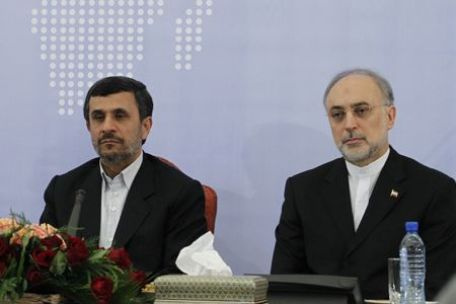Salehi Not an Ahmadinejadian Diplomat

By: Shayesteh Asadi
IRD: From the day on which Ali Akbar Salehi became the minister of foreign affairs and Manouchehr Mottaki’s diplomatic experiences scaled down to speeches and interviews, this important ministry has passed through a different stage, becoming more active and consistent than in the past.
One of the main factors that increased the number of activities and the level of wisdom in the diplomacy of the ministry of foreign affairs during the past year has been resolution of existing diarchy in the ministry, and more consistency with the Supreme National Security Council and the Leader’s statements. However, when Salehi took on the authority of the ministry, the domestic situation of Iran and that of the region were thoroughly different from in the past.
In the wake of the aggravating problems between Mottaki and Ahmadinejad, which led to the Iranian foreign minister’s humiliating dismissal during his visit to Senegal, Salehi was a good choice for the ministry. He could ensure a more powerful performance established upon the convictions of the Supreme Leader, and a different management style that could make up for the Mottaki-Ahmadinejad era of foreign policy in regional and international opinions.
During the last five years in which Ahmadinejad has been responsible for the Iranian foreign policy, his trademark harsh language prompted Western pressure, the consensus of the West and the East against Iran, issuance of anti-Iranian resolutions and statements in the UN; all of which etched in the global public opinion the image of a belligerent Iran. Apparently, it can be seen that in Salehi’s ministry the previous aggressive policy has been put aside, substituted with respect for diplomacy and political bargaining, wisdom and intellect.
One of the reasons for this is the cut in Ahmadinejad’s involvement and his attitudes about his diplomatic responsibilities. In the past two years, his problems with the higher echelon of Iran's ruling elite forced him shift focus towards domestic issues. The current ministry of foreign affairs does not seem to follow the policies and attitudes of Ahmadinejad.
Although Salehi’s attempts to improve relations with the Persian Gulf Arab states, Russia, Turkey and European powers are praiseworthy, the existing great obstacles caused his attempts and wisdom during the one and a half years to defuse the anti-Iranian atmosphere fall short.
The last week meeting in Tehran held with the ambassadors was aimed at bringing alignment among embassies and announcing the macro-policies against anti-Iranian regional and international attacks and consensus. A key objective of the meeting was to shore up diplomatic relations and promote the level of economic and political exchanges with other countries.
Undoubtedly, the past two or three years have been the worst in post-revolution Iranian diplomacy, as foreign countries’ adverse attitude towards the Iranian nuclear and military advances and the common misconducts in Iranian diplomacy have teamed up to push foreign relations to a level even lower than the stormy days of early post-Revolution years and the days of war with Iraq.

